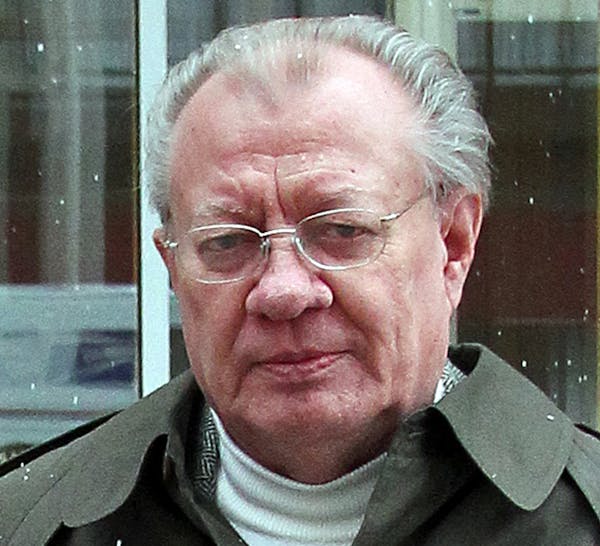The businessman who invented the Sleep Number bed could spend the rest of his days in prison after a jury on Wednesday found him guilty of cheating investors in an energy company he cofounded and ran for a decade.
A federal jury found Robert Walker, former CEO of Bixby Energy Systems, guilty of defrauding investors, tax evasion, witness tampering and conspiracy. He will be sentenced at a later date, but the most serious counts carry 20-year maximum terms.
The six female and six male jurors heard seven weeks of testimony and deliberated a day and a half. They hardly glanced at Walker as their 17-count guilty verdict was read before U.S. District Judge Susan Richard Nelson.
U.S. marshals led Walker away, and his wife, Joann, rose sobbing from the spectator seats. "He is 71 years old," she said later. "I am concerned about him spending the rest of his life in prison."
Walker suffers from psoriatic arthritis and was scheduled for medical treatment Wednesday.
But some of the 1,800 investors who lost $57 million on Bixby Energy's failed alternative energy projects said prison is where he belongs.
"He absolutely ripped off all of us," said investor Frank Simon, a retired businessman from Dayton, who now lives in Yuma, Ariz. "If I end up with getting nothing back, the only satisfaction I have is that he'll never get a chance to cheat anybody else."
Simon said he believes he was one of the original five investors in Bixby and eventually handed over $250,000 to Walker. He said he accepted Walker's claims that Bixby would eventually trade on the stock market, which would create a big profit for the investors. But a public offering never happened.
Walker cofounded Bixby in 2001, and it originally focused on producing corn-burning stoves to heat homes. When that business collapsed, he turned its focus to a developing a coal-to-gas technology, but it never worked. The company, based in Ramsey, collapsed in 2012, a year after two Bixby directors sued to oust Walker.
Investors were lured to Bixby by Walker and fundraisers he hired who worked for a 10 percent cut of each investment. Walker testified during the trial that he never intended to cheat anyone. But evidence revealed that Bixby had employed two felons, including one Walker had hired as chief financial officer and main fundraiser.
Steve DiBenedetto, a retired factory worker from Blaine, said he and several relatives all got sucked into the scam and lost money, in his case about $5,000. "He took a lot of money from a lot of people," DiBenedetto said. "I kept hearing them talk about how we're all going to make a lot of money. … But they just kept asking for more and more."
Walker rose to prominence in the 1980s when he founded Select Comfort, the maker of air mattresses with adjustable settings. His apparent success with that company convinced Bixby investors that it would fare well, too. But at the trial, a retired investment banker who helped bail out Select Comfort in its early years testified that Walker brought that company close to bankruptcy in 1991 and was booted out as CEO several years before it went public in 1998.
Prosecutors led by assistant U.S. attorneys David MacLaughlin and Benjamin Lagner built their case on more than 600 documents, including many e-mails and newsletter articles written by Walker that touted Bixby's technology. They were flashed on a giant screen as 33 investors, former executives and others testified about the company's downfall.
Stark contradictions
Among the more remarkable items was a June 2010 e-mail to a contractor in which Walker complained that Bixby's coal gasification machine didn't work. On the very same day, Walker put out a news release saying the company's "revolutionary process that efficiently converts coal into clean-burning energy has been developed and is commercially available."
Walker even enlisted a former congressman, Gil Gutknecht, to promote and invest in Bixby. Gutknecht, who represented the Rochester area in Congress for 12 years ending in 2007, joined the company's board but eventually grew disillusioned with Walker and was one of the directors to push for his ouster three years ago.
After Wednesday's verdict, Gutknecht said he and many others believed in the Bixby clean-coal process. He kept working until 2012 to commercialize it, but the first installations in China failed. The company was left with "machines that are worthless" and a "mountain of debt," he said. He doubts anyone will find hidden assets to recover. He declined to say how much he lost.
"It is a sad ending to a long, tragic story," Gutknecht said. "I feel bad for an awful lot of investors. … On the other hand, it is a relief."
Walker has been behind bars since August, when he violated his probation by contacting a government witness through an intermediary. That was the basis for the witness tampering charge. Walker's sentencing date hasn't been set.
During a pre-sentencing review, the victims of the Bixby scam and their losses will be tallied. Prosecutors are required to seek a restitution order, and a special civil unit in the U.S. attorney's office typically looks for assets to recover. But after a criminal investigation lasting six years and involving U.S. postal inspectors, the Internal Revenue Service and the FBI, the trial revealed no evidence that anything is left of investors' money.
Instead, prosecutors presented evidence that Walker enriched himself and others, and that Bixby never made a dime of profit. Walker once lived in a 12,000-square-foot home with an indoor pool in Ramsey. He also put his daughter, Melanie Bonine, on the payroll. She pleaded guilty last year to evading federal tax on Bixby securities she sold at a $700,000 profit. She also awaits sentencing.
After the verdict, prosecutors declined to comment on whether the Bixby investigation is over. In court papers, prosecutors previously have identified uncharged co-conspirators.
"We deeply appreciate the work of this jury," MacLaughlin said.
David Shaffer • 612-673-7090 • @ShafferStrib
